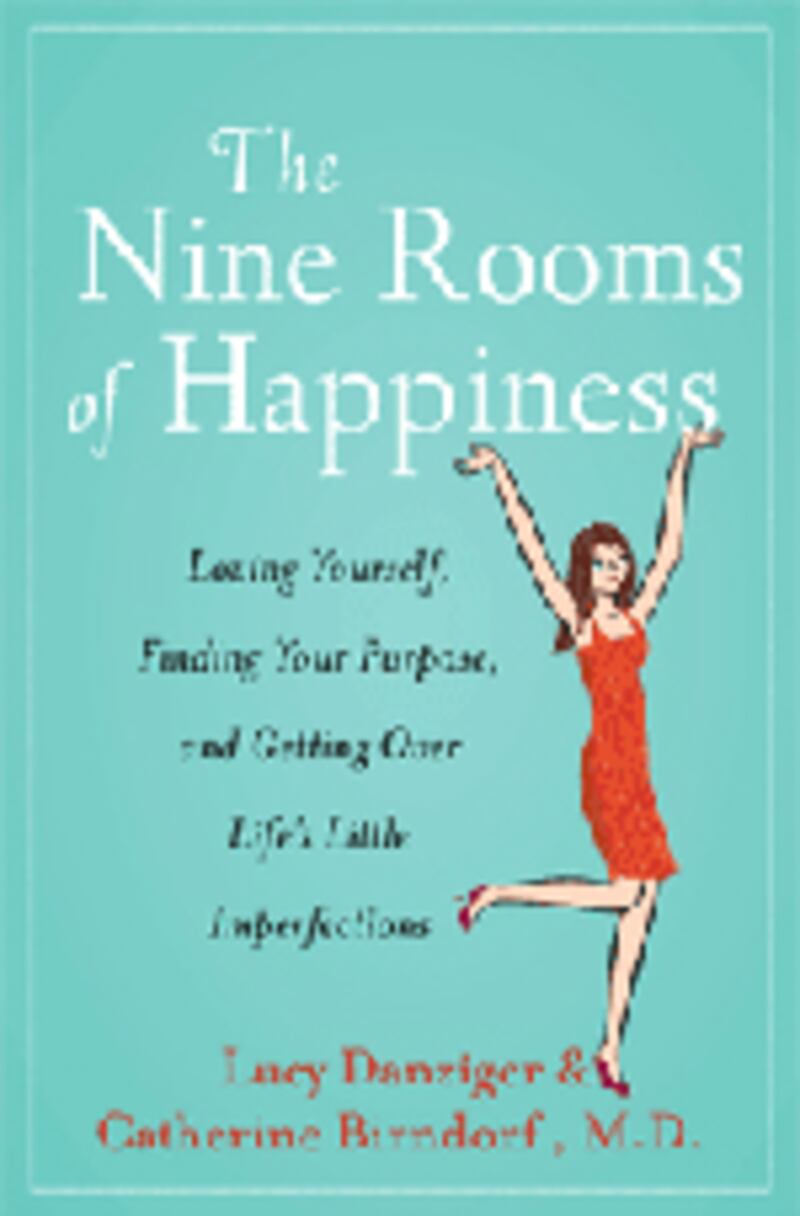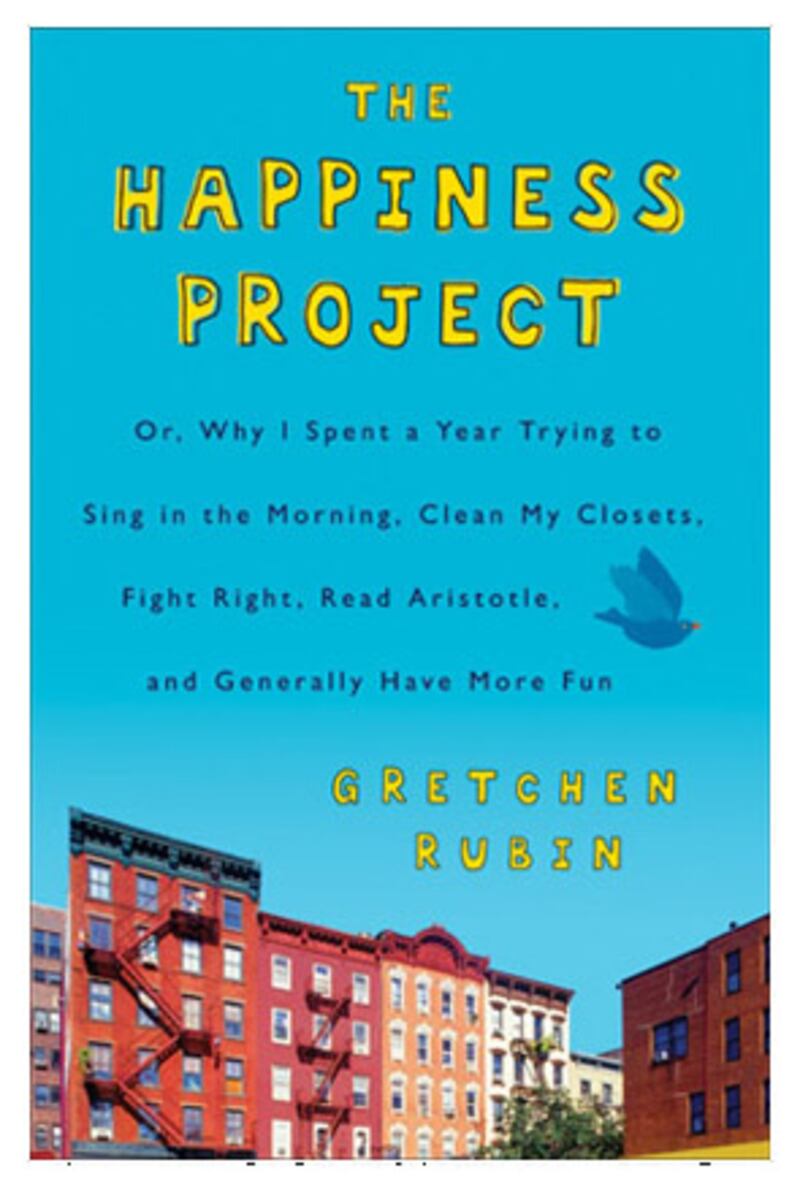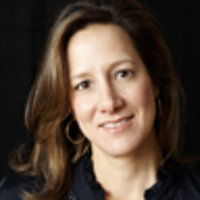
I didn't know how unhappy I was until I read the latest books about happiness. These epistles suddenly seemed to be on every shelf, in every book review: roadmaps for gratitude, journeys toward joy, research on what makes us buoyant, analyses of what gets us down. I'd stumble out of Barnes and Noble feeling drunk with inadequacy: why wasn't I improving myself today?
Reading The Happiness Project by former Supreme Court clerk and author Gretchen Rubin (six straight weeks on the New York Times bestseller list for advice books) and the just-published, The Nine Rooms of Happiness by Self Magazine editor Lucy Danziger and psychiatrist Catherine Birndorf of New York Presbyterian Hospital, reminded me of all the ways I don't maximize my happiness or even tend to it much. These books tell us happiness can be prioritized, studied, improved upon. They offer concrete tactics and battle plans. Over a year of conscious Happiness-seeking, Rubin found it in minor tweaks such as cleaning a closet, making a bed, burning a scented candle at work, keeping a one-sentence daily journal, singing every morning, and getting more sleep at night.
"Because you can only build a happy life on the foundation of your own nature," [Rubin] explains over her third cup of coffee, "and the more you are guided by what actually makes you happy, the happier you are."
"It's all these tiny little things," Rubin tells me, sitting in a coffee shop in a gray cardigan zipped over a white T-shirt (she writes about coming to accept her white T-shirt dependence and buying six at one time instead of trying to like other colors). "You can make yourself happier without changing your life. Your ordinary day can be happier. You don't even need an extra hour of free time."

Like Rubin, Danziger and Birndorf speak personally in their book, but they offer a different template: the house-as-metaphor. If we clean up the "mess" in each proverbial room, we'll feel lighter, more appreciative, less self-critical. The bathroom is where our body-image defeats us, the office is where our career anxieties fester, the basement is where our memories hibernate and ultimately interfere. "It is possible to build a sunnier outlook in every room," Danziger and Birndorf insist. They interviewed 100 women whose stories, the authors believe, highlight common stumbling blocks: insecurity, money tension, the short fuse of parenting. "Each woman is dealing with a different mess in their lives," says Danziger over tea a department store café. She appears to come straight out of central casting for Manhattan magazine editors: blonde, muscle-defined, fast-talking, husky-voiced. "We're going to help you clean up the rooms."
Rubin doesn't offer 100 women's stories; just her own. "I'm no expert, I have no secret. All I can talk about is what worked for me," she tells me. When I was writing this, I got a lot of push-back from people saying, 'You have nothing to tell anybody,' 'I don't believe in happiness', 'There's a million books like this.' I ran into a lot of that. But this is the comfort of the way I wrote the book: my authority comes from my own experience."
She made a list of Twelve Personal Commandments which include "Identify the problem; Lighten up; There is only love…." The one she says steers her most is, "Be Gretchen." "Because you can only build a happy life on the foundation of your own nature," she explains over her third cup of coffee, "and the more you are guided by what actually makes you happy, the happier you are."
Both these books encourage us to see happiness as a crucial pursuit, not a luxury. We're told if we're happier, we'll be kinder, more effective, more successful.
"It's not selfish," says Birndorf. "It's self-preservation."
All three women live on the east side of Manhattan, send their children to private schools, (full disclosure: though I don't know Rubin or Birndorf well, we all have fifth grade daughters in the same school and I've written for Self once), and run in high-achieving circles, but their books don't aim at one kind of woman nor do they feel that the demographic is particularly relevant. "You can be happy or unhappy at any end of the financial spectrum," Danziger says.
Rubin says that recognizing good fortune is part of the point of her book. "I think one of the things that really hit a chord for people was that I emphasize I was already pretty happy. And that one of the things I wanted to expect for myself was to feel more grateful for how much happiness I had."
Danziger met Birndorf five years ago, soon after she'd decided that Self needed a "happiness expert" just as it had a nutritionist, trainer, and sports physician advising readers. "It doesn't matter how fit you are if you're not happy," says Danziger. Almost as soon as she'd decided to find a happiness guide, she spotted Birndorf being interviewed by Katie Couric on the Today Show. "I said, 'You know what? I just found our expert.'"
Birndorf was initially reluctant. "I don't give advice to my therapy patients," she explains. "I don't tell them what to do." But she was talked into it when she realized she could offer readers tools instead of answers. "Happiness is not a destination or a goal," says Birndorf, who has a youthful amiability that Danziger says draws people out. "It's not about being happy all the time. It's about maximizing moments and experiences that make you happy."

When Danziger decided to write a book that looked at her own tendency—shared by many other women, she says—to "sabotage" her own happiness, she looked no further than Birndorf for a co-author. "We weren't really friends before this book," she admits. "But we became a two-headed beast by the end of the writing process, working shoulder to shoulder while our kids played together and our husbands ordered dinner. Our families merged."
They are self-described opposites: Danziger is the brash stoic whose childhood motto was, "Suck it up, buttercup," while Birndorf is a believer in "getting through it, not over it." What they viewed similarly was women's penchant to look at the deficit instead of what's good. "We steal our own happiness for no apparent reason," says Danziger. Birndorf said they ask women to ask themselves, "What are the things I keep doing that trip me up?"
I admit I'm one of those people who tend to self-flagellate and is too tethered to my to-do list, sometimes defeated by it. At first, these books, ironically, just added to my burdens because each strategy became yet another thing I wasn't doing consistently; all the de-stressing suggestions stressed me out. I'd forget to "Act the way I want to feel," as Rubin suggests, and I'd definitely drag my proverbial bathroom into my kitchen, despite Danziger/Birndorf's caution that one stress bleeds into another. At first, I couldn't retain all their motivating tips, let alone implement them. But as days passed, I actually found myself tossing them around in my head, and I'll admit that trying a few gave me an unexpected lift: my new one-sentence journal, for example, makes me mark the day in a way I've always wanted to, without having to recount every detail. Danziger and Birndorf make me feel entitled to claim my "tenth room"—the place where I take time just for myself without guilt (i.e. reading People Magazine in the bathtub). It may be an obvious idea to take a family-free moment to clear my head. But Danziger and Birndorf reminded me that, "Even your blackberry gets to recharge."
Of course I wonder if happiness tactics that come from someone else can ever stick. These authors would say they can; they offer themselves as stand-ins for each of us and their stories are ours, too. Both published guides suggest that gratitude, mindfulness, and reframing your outlook take discipline. I'm not certain I have it. But I do feel as if I'm beginning to get the hang of this happiness thing. These books aren't making me quite so miserable anymore.
Plus: Check out Book Beast for more news on hot titles and authors and excerpts from the latest books.
Abigail Pogrebin, a former 60 Minutes producer and freelance writer, has written two books: One and the Same: My Life as an Identical Twin and What I've Learned about Everyone's Struggle to be Singular and Stars of David.





